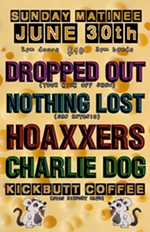Carrie Brownstein Stays Hungry
Sleater-Kinney slayer reps BookPeople on the Sabbath
By Alejandra Ramirez, 11:45AM, Fri. Oct. 30, 2015
Most music memoirs glorify the rock & roll fantasy, but not Carrie Brownstein’s Hunger Makes Me a Modern Girl, which begins, “I’ve always felt unclaimed.” Exhibiting as much wit as Portlandia and a kick worthy of Sleater-Kinney, the novel adds a crucial chapter to feminist rock literature. Her book tour stops Sunday at Central Presbyterian Church.

Austin Chronicle: What did you learn most about yourself while writing the book?
Carrie Brownstein: While you’re writing a book, you’re really working on the architecture of the book, the structure, and the narrative arc. So it’s much more deliberate and intentional. It doesn’t feel like you’re writing a journal or transcribing events from your life, so a lot of the learning about myself personally and as a writer came later on.
There are a lot of revelations, and a lot of what I learned is how to be a better writer, actually. The rigor of writing is no magic and requires sitting down and doing it. Completing the task at hand. In the morning, I would often get up very early and do nothing other than write for nearly a whole day.
AC: Many times in the book music is personified, taking on a very real presence and form.
CB: Definitely. I feel very protective of music and hold it in high regard. It’s something through which I found my own voice and a sense of wholeness, a place of community and in some sense salvation. I think to give yourself to some sort of medium is an allowance for a sense of wonder. And I think once you’re living in a world of awe as a fan, in some ways, you’re victim to its nuances and allow yourself the vulnerability of experience.
AC: You talk about that experience in your relationship to fandom.
CB: Fandom is definitely something I’m interested in. I’ve always been an observer of the ways in which people coalesce around a common love and the way in which people communicate that love outside of everyday discourse. It’s just something I’m really interested by.
AC: What fandoms do you find yourself in today?
CB: So many, but I guess a few would be Kendrick Lamar. I think he’s probably put out the best album of the year with To Pimp A Butterfly. I’m also a huge fan of Joanna Newsom’s new album, Divers. I think any year she releases an album is a good year.
AC: It’s interesting to see in the book how during the riot grrrl movement, you grow from being a part of that fandom to actually being the one admired and having a fandom of your own.
CB: In some ways, I welded myself into a world of existence that I wanted as a means of self-expression and a break in the longing and distance I felt growing up. I’ve tried to always maintain an awareness of the importance of being recognized and being listened to by people whom you admire, and I continue to go through the world with that awareness. I think it’s easier for me now as I have less anxiety about that interaction.
While I was in Sleater-Kinney, I would worry about the disparity of who people thought I was and who I actually was and being somebody in the day to day interactions. I worry about that less now. I think one of the great things about social media is that it’s such a short hand to communicating with people.
AC: You felt at times there was a constant sort of validation and invalidation of one’s experience. Do you feel social media has made that worse?
CB: Well, I think it’s easier to go and find like-minded people. If you have a sense of alienation from one community or form of political ideology, I think you can find a group of people with whom you feel a kin to and a relationship with. But, I don’t know. I think social media also has the illusion of feeling inclusive. Of course I really value face to face and personal interactions, and I hope that people have real life friends with whom they’re close to.
AC: In the book you talk about how when you were growing up, it was important for you to be different, but you also had this longing and desire to belong. Do you still find that true today?
CB: I think today in my life and for the past decade, as I’ve gotten older, my desire to fit into the whole mainstream society or whatever that might be isn’t there anymore. I care less about the notion of likability and presenting myself to people who would never understand me in a way that makes me powerful. That’s uninteresting to me.
At the same time, with my personal life and with my friends and family and people whom I meet, I feel a greater ease in terms of openness and willingness and compassion. I feel very comfortable and that I have a very rich life in my sense of belonging and being seen.
AC: You write about how you wanted Sleater-Kinney to be anything but pretty. What was it about the ugly side of music that spoke to you?
CB: It’s a very galvanic and somewhat dangerous sound that is – to me – the best version of Sleater-Kinney. Something pretty wouldn’t be the right sound. That doesn’t mean that I have some sort of aversion to beauty in music, but it would be a mismatch of sound and not a true representation of how we communicate as a band. I think our best moments are ones that are caustic.
AC: That really resonates in your statement of how you think music was a voice for you to express defiance and dissatisfaction. What are you dissatisfied with now?
CB: It would take a large amount of denial and willful ignorance to not examine the world and feel dissatisfied with the state of our country in terms of inequality and economics, and in terms of police brutality, in terms of women’s healthcare and the war against Planned Parenthood. There’s also widespread transphobia and racism. There’s plenty to feel dissatisfied about, but at the same time I believe that a good deal of optimism and encouragement come from the sense that there is a collective feeling of dissatisfaction about that. Hopefully that will kick forth into participation and then hopefully transformation.
AC: Hunger took a very physical and metaphorical form in your book, whether it’s your mom living with anorexia, or you drawing inspiration from Bikini Kill and Sleater-Kinney’s music. Why hunger?
CB: Yeah, the title I thought would be evocative and it’s a line within a Sleater-Kinney song, “Modern Girl.” The literal and figurative theme of hunger is writ large in my book, and I think what hunger creates, whether metaphorically or not, is some sort of lacking or wanting. And a lot of what this book is about is going through a sense of being disembodied to embodied, and that the desire to finally come to terms with a sense of presence that is hopefully not just a physical body, but is also an ability to have feeling.
The book is a lot about that process. A lot of it is about finding that wholeness even when I still felt that everything around me, whether it was family or the city I lived in, was sort of falling apart.
AC: In the book it’s clear music filled that emptiness. Do you think you’ll always treasure being a fan as much as you did when you were younger?
CB: Absolutely. I’m an incessantly curious person, thinker, and someone who wants to be engaged in contemporary culture that doesn’t feel overly nostalgic about the past. I think it’s kind of a rabbit hole to go down once you think that the past is better than the present or future. The only thing we can exist in is the here and now so you have to embrace it and not have distaste for it.
Part of that for me is being a fan and wanting to hear the music and discover new art and books and film. So yeah, I feel very engaged in it, and especially with music and books. I like to be in a contemporary place with those things.
A note to readers: Bold and uncensored, The Austin Chronicle has been Austin’s independent news source for over 40 years, expressing the community’s political and environmental concerns and supporting its active cultural scene. Now more than ever, we need your support to continue supplying Austin with independent, free press. If real news is important to you, please consider making a donation of $5, $10 or whatever you can afford, to help keep our journalism on stands.
Oct. 27, 2023
Carrie Brownstein, Sleater-Kinney









